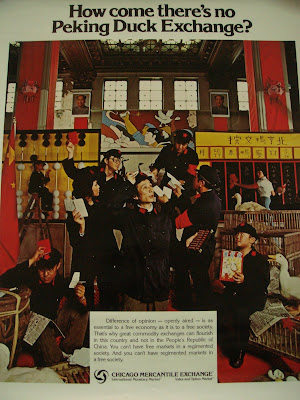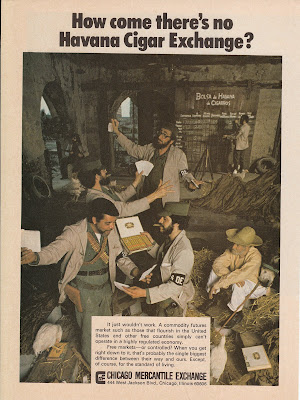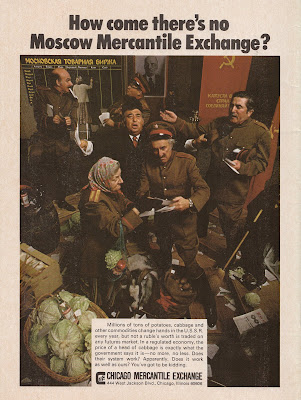Below are three posters from approximately 1974 when the CME did an ad campaign mocking communist countries. I can recall seeing one mocking Yugoslavia in an office but I haven't seen it again. If anyone has a copy, please submit it!

How come there's no Peking Duck Exchange? Difference of opinion - openly aired - is as essential to a free economy as it is to a free society. That's why great commodity exchanges can flourish in this country and not in the People's Republic of China. You can't have free markets in a regimented society. And you can't have regimented markets in a free society.

How come there's no Havana Cigar Exchange? It just wouldn't work. A commodity futures market such as those that flourish in the United States and other free countries simply can't operate in a highly regulated economy. Free markets - or controlled? When you get right down to it, that's probably the single biggest difference between their way and ours. Except, of course, for the standard of living.

How come there's no Moscow Mercantile Exchange? Millions of potatoes, cabbage and other commodities change hands in the U.S.S.R. every year, but not a ruble's worth is traded on any futures market. In a regulated economy, the price of a head of cabbage is exactly what the government says it is - no more, no less. Does their system work? Apparently. Does it work as well as ours? You've got to be kidding.
 The following photo is the moments before the final trading bell of the MGEX floor. Many spectators crowded around the pit and really only about a dozen or so guys were trading. One of my mentors, Dan Roemer, is trading in the yellow jacket.
The following photo is the moments before the final trading bell of the MGEX floor. Many spectators crowded around the pit and really only about a dozen or so guys were trading. One of my mentors, Dan Roemer, is trading in the yellow jacket. 








